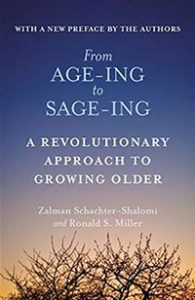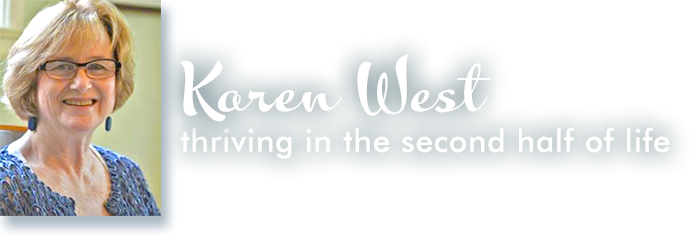When they get old, and especially when they retire, a lot of people fear the loss of their identity. In their adulthood, the identity that is uppermost for most people is their work identity. Asking and answering the question “What do you do?” is often the conversation starter when we meet a new person. “I am a teacher.” “I am an engineer.” “I am an artist.”
I often hear older people talking about how they are struggling with this loss, but I don’t hear nearly as many people talking about creating a new identity. I don’t think that most older people even see this as a possibility. But it is a critically important part of being in the second half of life. In his ground-breaking book From Age-ing to Sage-ing: A Revolutionary Approach to Growing Older, Rabbi Zalman Schachter-Shalomi writes:
 “While we wrestle with many challenging issues in later life, success in spiritual eldering {another term for “sage-ing.”} ultimately depends on answering one simple but potentially life-changing question. Rabbi Zusya of Hanipol, a great Hasidic master, posed that question shortly before his death. ‘In the coming world, they will not ask me,’ Why were you not like Moses?’ They will ask me, Why were you not what you, Zusya, could have been?’
“While we wrestle with many challenging issues in later life, success in spiritual eldering {another term for “sage-ing.”} ultimately depends on answering one simple but potentially life-changing question. Rabbi Zusya of Hanipol, a great Hasidic master, posed that question shortly before his death. ‘In the coming world, they will not ask me,’ Why were you not like Moses?’ They will ask me, Why were you not what you, Zusya, could have been?’
In the same way, each of us must grapple with the question, ‘Why was I not what I could have been?’ If we compare our lives to an unpolluted stream, then in the normal course of living, the waters of self get muddied with many foreign substances. The inner work of spiritual eldering helps precipitate out many of the contaminants, enabling us to return to the clarity of our true nature. We become individuated, living not as Moses, the Buddha, Jesus, or Mohammed, but as the precious, unique, nonrepeatable experiments of the universe that we are.” (107)
In the first half of our lives, we are trying to create our identity, and as we do so, there are many things that influence us. Rabbi Zalman writes about how important it is that “we take active responsibility for our destiny in old age, living by conscious choice rather than by social expectation.” He says that instead of saying “I live,” many of us would have to say “I’m being lived.” If we looked back on our lives with complete honesty, many of us would conclude, ‘I was lived by my parents; I was lived by my teachers; I was lived by society.’” (39)
I wonder how many people see themselves as a “precious, unique, nonrepeatable experiment of the universe,” and if they do realize that, I wonder how old they were when they first realized it. I’m guessing for most people it wouldn’t have been when they were working eight hours a day, driving their kids to appointments and activities, doing chores around the house, and just trying to make it through each busy day. And for most of us, it isn’t until we’re older that we start thinking about what they will ask us “in the coming world.”

One of the things we have more time for when we’re older is deep reflection and spiritual growth. In my last blog entry, I quoted what Kathleen Dowling Singh said in The Grace in Aging: Awaken as You Grow Older. As we get older, we can choose to begin to disengaging “from busy-ness and its worldly, mindless persona.” (104) And as it says in From Age-ing to Sage-ing, “In elderhood, we can derive our identity more from the level of being, rather than doing…As we become more contemplative, we rely less on finding self-worth through our performance in the work world. Gradually we find another dimension opening up in which our identity comes not from what we do, but from what we are.” (127)
In the second half of life, we can slow down and, as Kathleen Dowling Singh says, we can choose “to fully make our own acquaintance.” (104) And Rabbi Zalman tells us how spending some time doing “life review” will help us to do this. In my blog entry called “Sage-ing” I said that in Sage-ing, there are six core topics. Up until this point, my blog entries have been mainly about the first core topic “images of aging.” My next entries will be about the second core topic “life review.”

